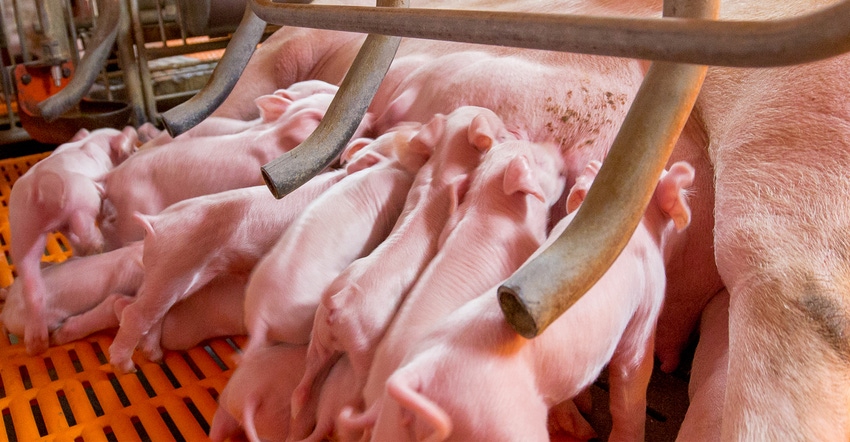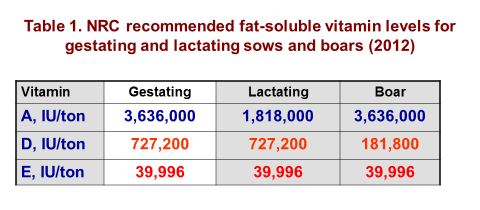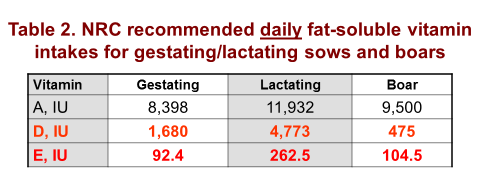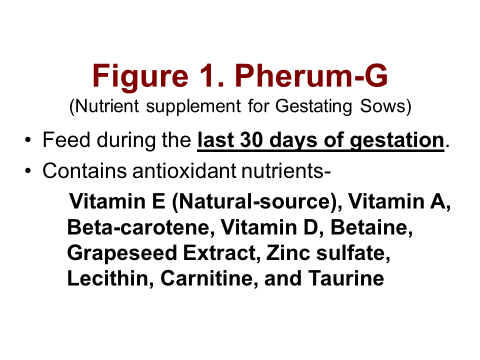Critical times for fat-soluble vitamin intake for today's swine
Gestation, birth, and post-weaning are critical times to be concerned about optimum fat-soluble vitamin status.
September 1, 2019

Sponsored Content
Causes for concern.
The combination of husbandry practices (pasture vs confinement) and dramatic improvements in swine genetics places more emphasis on the importance of adequate supplementation of fat-soluble vitamins in all phases of swine production. Improvements in pigs born per year with a corresponding reduction in weaning weight due to larger liter numbers is a critical factor impacting both sow and nursing pig mortality. Reduced farrowing rates and elevated sow death losses afflicting P0 and P1 sows and mortality in nursing and weaned pigs may be due to lack of fat-soluble vitamins, especially vitamin E. The benefits of adequate fat-soluble vitamins may play an important role in meeting needs for optimum animal performance.
NRC Nutrient recommendations are not keeping up with genetic potential.
The 2012 NRC Nutrient Requirements of Swine has the most recent requirements for fat-soluble vitamins. Requirements for vitamin A and vitamin E were not increased from the 1998 NRC publication, but the vitamin D requirement was increased four-fold from 200 to 800 I.U. per kg diet. The problem with updating vitamin requirements is the lack of vitamin research. Sadly, it is highly unlikely that changes in vitamin requirements will be made in future NRC publications due to lack of research. This is a prime example of nutrition recommendations not keeping up with improved swine genetics. Another issue is that the NRC does not take into consideration feed intake between gestating and lactating sows. Table 1 has the requirements for gestating and lactating sows and boars. Note that the vitamin D and vitamin E levels are the same for gestating and lactating sows. The requirements does not take into consideration the differences in daily feed intake between gestating sows and lactating sows. Table 2 displays the daily vitamin intakes when daily feed intake is considered. Note that the NRC’s recommended vitamin E intake is only 92 I.U. per day which is almost three times less daily intake compared to lactating sows.


Two critical areas of greatest concern.
Vitamin needs for the late-term gestating sow and newly-weaned pigs are the two areas of major concern. During the last 30 days of gestation, fetal growth is dramatically increased and during the last 3-7 days, colostrum production commences. University research has demonstrated that gestating sows injected with vitamins A, D and E (VITAL E-Repro) had dramatically higher vitamin levels in colostrum. That resulted in higher vitamin status of the newborn pigs.
The second area of concern is the newly-weaned pig. Extensive research has shown that pigs cannot efficiently utilize the form of vitamin E found in nursery diets. This results in a dramatic reduction in vitamin E status after weaning.
Solutions to overcome vitamin inadequacies.
For the Gestating Sow: Supplementing the gestating sow’s feed with dramatically higher levels of vitamins during the 30 days will improve vitamin status at farrowing. PHERUM-G Nutrient Supplement (Stuart Products, Inc.) has recently been introduced to overcome the lack of vitamin and antioxidant nutrient intake during the end of the gestating period (See Figure 1). When added to feed at 3 lb per ton, vitamin E intake is increased to 400 I.U. per day. This is approximately 4-times higher than the NRC vitamin E recommendation. Other nutrients, such as beta-carotene are also included in the premix.

Injecting sows with vitamins A, D and E from 3-7 days prepartum has revealed several key benefits. Delivery time is reduced approximately 5 min. per pig., stillborns are reduced in older sows, and colostrum has dramatically higher levels of fat-soluble vitamins. The recommended program is to inject the sow with 5 mL VITAL E-Repro prior to farrowing and again at weaning to help at breeding.
For the weaned pig: Administering micellized, active vitamin E (d-alpha-tocopherol) and vitamin D in drinking water has been shown to enhance vitamin E and vitamin D status at an optimum level during the first 2-3 weeks post-weaning. EMCELLE E-D3 Liquid (Stuart Products, Inc.) is a micellized liquid that is administered in drinking water that helps maintain vitamin E status at weaning and enhance vitamin D status, due to low intake from milk.
Recommended Fat-soluble Vitamin Programs for Swine:
Gilts and sows
PHERUM G-feed supplement- supplement ration during the last 30 days of gestation.
VITAL E-REPRO Injection (5 mL), used at three to seven days pre-farrowing and at weaning time. Each injection costs about $1 per sow.
Birth
VITAL E-Newborn Injection (0.5 mL). This injectable, which can be administered at processing along with an iron shot, costs less than 10 cents per pig.
Nursery
EMCELLE E-D3 Liquid is administered through the drinking water for two to three weeks post-weaning and costs 25 to 35 cents per pig during the two- to three-week program.
Grow-finish
EMCELLE E-D3 Liquid, or EMCELLE D3 Liquid, pulsed monthly, or as needed.
About the Author(s)
You May Also Like



